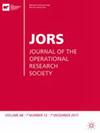A material balance approach for modelling banks’ production process with non-performing loans
IF 2.7
4区 管理学
Q2 MANAGEMENT
引用次数: 0
Abstract
The aim of this to study is to examine how non-performing loans on the balance sheets of Japanese banks affect their performance by adopting a material balance principle. The paper outlines how the material balance conditions can be applied when modelling banks’ production process in the presence of non-performing loans. The paper utilizes the generalized weak G-disposability principle which accounts for the heterogeneity among banks’ input quality. We test how an input-oriented model (non-performing loans are treated as an input), the weak disposability assumption and the adopted material balance approach, affect banks’ performance levels. We apply our test on a sample of Japanese banks over the period 2013 to 2019. Our findings indicate that the input-oriented model and the material balance estimator even if they present similar distributions, they account differently the effect of non-performing loans’ fluctuations over the examined period. In addition, the results under the weak disposability assumption are found to be different compared to the material balance measures and less sensitive to banks’ non-performing loans variation levels. We also provide evidence that the generalized weak G-disposability assumption captures better banks’ performance fluctuations that has been caused by the restructuring of the Japanese banking industry.不良贷款对银行生产过程建模的物质平衡方法
本研究的目的是通过采用物质平衡原则来考察日本银行资产负债表上的不良贷款对其业绩的影响。本文概述了在对存在不良贷款的银行生产过程进行建模时如何应用物质平衡条件。本文利用广义弱g -可处置性原理来解释银行投入质量的异质性。我们检验了以投入为导向的模型(将不良贷款视为投入)、弱可处置性假设和采用的物质平衡方法如何影响银行的绩效水平。我们对2013年至2019年期间的日本银行样本进行了测试。我们的研究结果表明,即使投入导向模型和物质平衡估计器呈现相似的分布,它们也不同地解释了不良贷款在研究期间波动的影响。此外,发现弱处置假设下的结果与物质平衡措施不同,对银行不良贷款变化水平的敏感性较低。我们还提供证据表明,广义弱g处置能力假设反映了日本银行业重组造成的较好的银行业绩波动。
本文章由计算机程序翻译,如有差异,请以英文原文为准。
求助全文
约1分钟内获得全文
求助全文
来源期刊

Journal of the Operational Research Society
管理科学-运筹学与管理科学
CiteScore
6.80
自引率
13.90%
发文量
144
审稿时长
7.3 months
期刊介绍:
JORS is an official journal of the Operational Research Society and publishes original research papers which cover the theory, practice, history or methodology of OR.
 求助内容:
求助内容: 应助结果提醒方式:
应助结果提醒方式:


